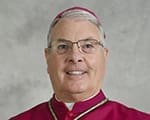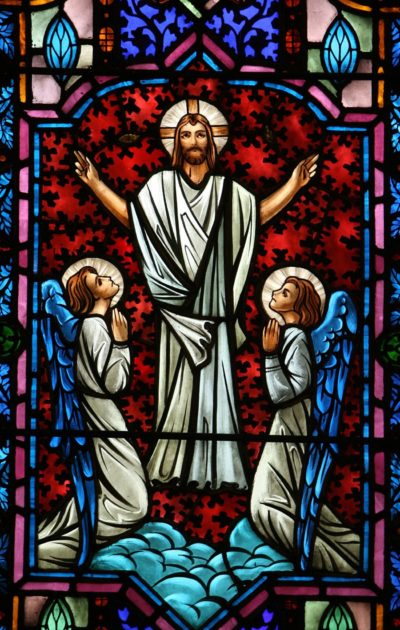 Archbishop Gregory J. Hartmayer, OFM Conv., is the seventh Archbishop of Atlanta. In his award-winning column “Peace and All Good,” he shares homilies and pastoral reflections.
Archbishop Gregory J. Hartmayer, OFM Conv., is the seventh Archbishop of Atlanta. In his award-winning column “Peace and All Good,” he shares homilies and pastoral reflections.Up, up and away
By ARCHBISHOP GREGORY J. HARTMAYER, OFM Conv. | Published May 2, 2021 | En Español
This week, I share an ancient legend about the ascension of Jesus into heaven. According to this legend, when Jesus reached heaven, his body still showed the wounds of crucifixion.
His hands and feet still bore the prints of the nails. His side bore the mark from the spear. His back bore the strips from the whip, and his head bore the wounds from the thorns.
When the people in heaven saw these marks, they fell on their knees before Jesus. They were astounded to see how much he had suffered.

Christ’s ascent to heaven is depicted in a stained-glass window at St. Clotilde Church in Chicago. The feast of the Ascension celebrates the completion of Christ’s mission on earth and his entry into heaven. CNS photo/Karen Callaway, Catholic New World
Then the angel Gabriel rose up and said to Jesus, “Lord, how greatly you suffered on earth! Do all the people on earth know and appreciate how much you went through for them and how much you love them?
Jesus replied, “Well, no. There’s only a handful of people in Palestine who know that. The rest have not heard of me. They do not know who I am. They do not know how much I suffered and they do not know how much I love them.”
Gabriel was shocked to hear this. He said to Jesus, “How will the rest of the people on earth ever learn about your suffering and your love?”
Jesus said, “Just before I left, I told Peter, James and John and a few friends, to tell the rest of the world for me. They will tell as many people as they can and those people, in turn, will tell other people. In that way, the whole world will eventually know about my love for them.”
Gabriel looked even more confused now. He knew how fickle people are. He knew how forgetful they are. He knew how prone to doubt they are and so he said to Jesus, “But Lord, what if Peter, James and John grow tired or frustrated? What if they forget about you? And even if none of these things happen, what if the people they tell get tired or forget?
Did you take any of these things into account? Do you have a backup plan?”
Jesus said, “This is the only plan I have. I am counting on Peter, James and John and I am counting on the people they tell not to let me down.”
Two thousand years later, Jesus still has no other plan. He counted on Peter, James and John and on the people that they told and he is counting on us.
The early church was a persecuted church. Many people lost their lives because they refused to compromise or give up their faith in Jesus Christ.
Stephen, the deacon, was the first martyr of the faith. Hundreds and thousands of martyrs followed. John the Baptist was beheaded, the early Christians were captured and put into stadiums and fed to wild animals and the Romans cheered the animals on.
Recall the number of saints who have been martyred for the faith. The church throughout history has been a church of martyrs.
The irony is that the more people were martyred for the faith, the more people wanted to join the faith and the church grew in great numbers according to the Acts of the Apostles.
The Catholic Church and Christianity in general is still being persecuted. Look what has happened in the Middle East where Christianity was born.
Hundreds of thousands of Christians have been hunted and forced to leave their home, villages and their country taking only what they can carry. Hundreds of thousands have left Iraq, Libya, Syria. Countless Christians have been killed and beheaded because they were disciples of Jesus Christ.
There are different kinds of persecution. Our society is slowly becoming Godless. Look at the institution of the family, the definition of marriage, the sanctity of all human life and the loss of religious freedom.
What is the future of religion and religious freedom in our society? Reference to God and the use of God’s name is becoming more and more restricted.
The late Cardinal Francis George of Chicago died in 2015 from cancer at the age of 78. Before he died, speaking about religious freedom, Cardinal George said that he expected to die in bed, that his successor would die in jail and his successor would be martyred in the public square. Is that a prophecy of things to come in our own society?
We are about to celebrate the Feast of the Ascension which is one of the most important feasts of the liturgical year. We celebrate Jesus’ return to his Father on the day.
The Feast of the Ascension is like the passing of a baton from one runner to another. On the day of his ascension to heaven 2,000 years ago, Jesus passed the baton of his work to Peter, James and John. They in turn passed it to the people who came after them. They, in turn, passed it on to us. Now it is our turn to pass it on to others.
Practically speaking, what does this mean?
The way to begin preaching about Jesus to the world is to live and witness the Gospel in our own lives—to embrace a personal value system that reflects the teachings of Jesus. We are called to live the Gospel values within our family and in the workplace. Let it be known that we are disciples of Jesus Christ. He is counting on us. There is no backup plan.
We must never underestimate the power of prayer. We need to have the courage of the martyrs of the church. We must stand up for what is good, right and just. We must reject and be strong against all that is evil.
As disciples of Christ, we must stand up for the values of the Gospel—even if we have to stand up alone.